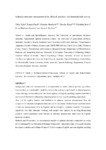Aphasia outcome measurement in clinical practice: an international survey

View/
Use this link to cite
http://hdl.handle.net/2183/32410Collections
- Investigación (FCS) [1293]
Metadata
Show full item recordTitle
Aphasia outcome measurement in clinical practice: an international surveyAuthor(s)
Date
2022-08-18Citation
Chloe Tyler, Emma Finch, Kirstine Shrubsole, Brooke Ryan, Efstathia Soroli, Silvia Martinez-Ferreiro & Sarah J. Wallace (2022) Aphasia outcome measurement in clinical practice: an international survey, Aphasiology.
Abstract
[Abstract] Background. Outcome measurement is recommended in stroke clinical practice guidelines, however there is considerable variability in how this activity is performed in clinical practice. Factors driving clinician behaviour have been explored in English-speaking countries, but little is known about the factors influencing clinical practice in non-English-speaking populations.
Aims. (1) To explore barriers and facilitators to aphasia outcome measurement from the perspective of international aphasia clinicians. (2) To determine whether barriers and facilitators to outcome measurement differ in English- and non-English- speaking countries. The primary hypothesis was that clinicians working with people with aphasia in non-English-speaking countries would experience more barriers to outcome measurement than those in English-speaking countries.
Methods and Procedures. An international sample of aphasia clinicians completed an online survey informed by the Theoretical Domains Framework. Quantitative data were analysed using descriptive statistics and a Mann-Whitney U Test to compare English- and non-English- speaking groups. TDF domains identified as influencing clinician behaviour were mapped to the Behaviour Change Wheel, producing theory-informed strategies to improve practice.
Outcomes and Results. A total of 208 clinicians from 25 countries completed the survey. Almost all (93.7%) reported measuring outcomes to some extent, most commonly to measure client progress. Facilitators to outcome measurement included “social/professional role and identity” (understanding that measuring outcomes is part of the clinicians’ role), “optimism” (feeling positive about measuring outcomes), and “emotion” (enjoying, and feeling comfortable measuring outcomes). Barriers were “environmental context and resources” (time and resource limitations, and competing caseload priorities), “behavioural regulation” (a lack of personal and workplace systems to measure outcomes) and “skills” (having insufficient training and experience in outcome measurement). There was no significant difference between the barriers and facilitators experienced by clinicians in English- and non-English- speaking countries. Implementation strategies, informed by Behaviour Change Techniques, were created to improve clinical practice.
Conclusions. Internationally, clinicians working with people with aphasia measure outcomes and believe that this is part of their role, and a positive aspect of their work. Common barriers to outcome measurement included insufficient time and access to resources, inadequate personal and workplace systems, and insufficient skills necessary for performing outcome measurement. Preliminary, theory-informed strategies (e.g., improving access to culturally and linguistically appropriate measurement instruments; developing protocols, templates or checklists guided by recommended practice; and providing training in outcome measurement) would assist with uptake of clinical practice guidelines in this area.
Keywords
Outcome measures
International
Aphasia
Barriers and facilitators
Theoretical domain framework
International
Aphasia
Barriers and facilitators
Theoretical domain framework
Editor version
ISSN
0268-7038





